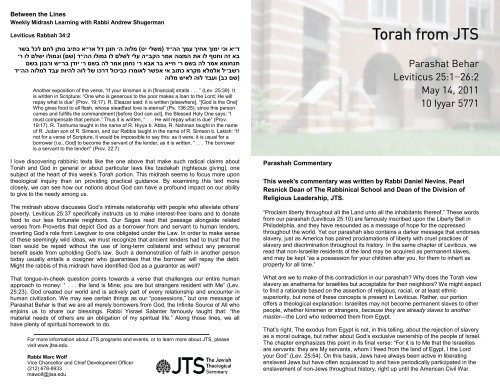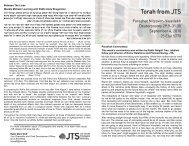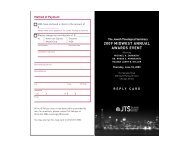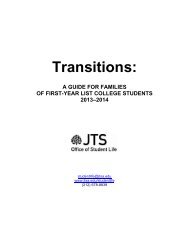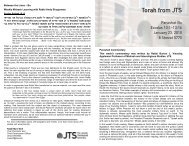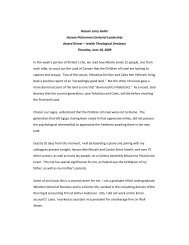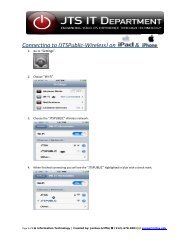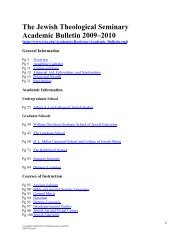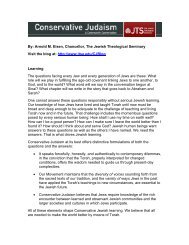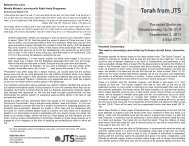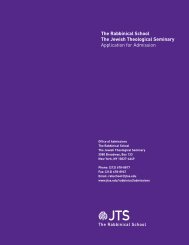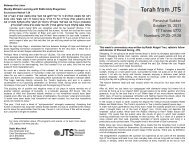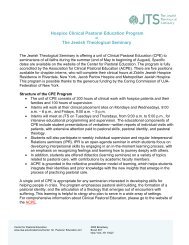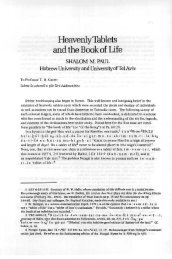Torah from JTS - The Jewish Theological Seminary
Torah from JTS - The Jewish Theological Seminary
Torah from JTS - The Jewish Theological Seminary
You also want an ePaper? Increase the reach of your titles
YUMPU automatically turns print PDFs into web optimized ePapers that Google loves.
Between the Lines<br />
Weekly Midrash Learning with Rabbi Andrew Shugerman<br />
Leviticus Rabbah 34:2<br />
ד״א וכי ימוך אחיך עמך הה״ד (משלי יט) מלוה ה׳ חונן דל אר״א כתיב נותן לחם לכל בשר<br />
בא זה וחטף לו את המצוה אמר הקב״ה עלי לשלם לו גמולו הה״ד (שם) וגמולו ישלם לו ר׳<br />
תנחומא אמר לה בשם ר׳ חייא בר אבא ר׳ נחמן אמר לה בשם ר׳ יודן בר״ש ורבנן בשם<br />
רשב״ל אלמלא מקרא כתוב אי אפשר לאומרו כביכול דרכו של לוה להיות עבד למלוה הה״ד<br />
(שם כב) ועבד לוה לאיש מלוה<br />
Another exposition of the verse, “If your kinsman is in [financial] straits . . . ” (Lev. 25:39). It<br />
is written in Scripture: “One who is generous to the poor makes a loan to the Lord; He will<br />
repay what is due” (Prov. 19:17). R. Eleazar said: It is written [elsewhere], “[God is the One]<br />
Who gives food to all flesh, whose steadfast love is eternal” (Ps. 136:25); since this person<br />
comes and fulfills the commandment [before God can act], the Blessed Holy One says: “I<br />
must compensate that person.” Thus it is written, “ . . . He will repay what is due” (Prov.<br />
19:17). R. Tanhuma taught in the name of R. Hiyya b. Abba, R. Nahman taught in the name<br />
of R. Judan son of R. Simeon, and our Rabbis taught in the name of R. Simeon b. Lakish: “If<br />
not for a verse of Scripture, it would be impossible to say this: as it were, it is usual for a<br />
borrower [i.e., God] to become the servant of the lender; as it is written, “ . . . <strong>The</strong> borrower<br />
is a servant to the lender!” (Prov. 22:7)<br />
I love discovering rabbinic texts like the one above that make such radical claims about<br />
<strong>Torah</strong> and God in general or about particular laws like tzedakah (righteous giving), one<br />
subject at the heart of this week’s <strong>Torah</strong> portion. This midrash seems to focus more upon<br />
theological inquiry than on providing practical guidance. By examining this text more<br />
closely, we can see how our notions about God can have a profound impact on our ability<br />
to give to the needy among us.<br />
<strong>The</strong> midrash above discusses God’s intimate relationship with people who alleviate others’<br />
poverty. Leviticus 25:37 specifically instructs us to make interest-free loans and to donate<br />
food to our less fortunate neighbors. Our Sages read that passage alongside related<br />
verses <strong>from</strong> Proverbs that depict God as a borrower <strong>from</strong> and servant to human lenders,<br />
inverting God’s role <strong>from</strong> Lawgiver to one obligated under the Law. In order to make sense<br />
of these seemingly wild ideas, we must recognize that ancient lenders had to trust that the<br />
loan would be repaid without the use of long-term collateral and without any personal<br />
benefit aside <strong>from</strong> upholding God’s law. Such a demonstration of faith in another person<br />
today usually entails a cosigner who guarantees that the borrower will repay the debt.<br />
Might the rabbis of this midrash have identified God as a guarantor as well?<br />
That tongue-in-cheek question points towards a verse that challenges our entire human<br />
approach to money: “ . . . the land is Mine; you are but strangers resident with Me” (Lev.<br />
25:23). God created our world and is actively part of every relationship and encounter in<br />
human civilization. We may see certain things as our “possessions,” but one message of<br />
Parashat Behar is that we are all merely borrowers <strong>from</strong> God, the Infinite Source of All who<br />
enjoins us to share our blessings. Rabbi Yisrael Salanter famously taught that: “the<br />
material needs of others are an obligation of my spiritual life.” Along those lines, we all<br />
have plenty of spiritual homework to do.<br />
For more information about <strong>JTS</strong> programs and events, or to learn more about <strong>JTS</strong>, please<br />
visit www.jtsa.edu.<br />
Rabbi Marc Wolf<br />
Vice Chancellor and Chief Development Officer<br />
(212) 678-8933<br />
mawolf@jtsa.edu<br />
Parashah Commentary<br />
<strong>Torah</strong> <strong>from</strong> <strong>JTS</strong><br />
Parashat Behar<br />
Leviticus 25:1−26:2<br />
May 14, 2011<br />
10 Iyyar 5771<br />
This week's commentary was written by Rabbi Daniel Nevins, Pearl<br />
Resnick Dean of <strong>The</strong> Rabbinical School and Dean of the Division of<br />
Religious Leadership, <strong>JTS</strong>.<br />
“Proclaim liberty throughout all the Land unto all the inhabitants thereof.” <strong>The</strong>se words<br />
<strong>from</strong> our parashah (Leviticus 25:10) are famously inscribed upon the Liberty Bell in<br />
Philadelphia, and they have resounded as a message of hope for the oppressed<br />
throughout the world. Yet our parashah also contains a darker message that endorses<br />
slavery, just as America has paired proclamations of liberty with cruel practices of<br />
slavery and discrimination throughout its history. In the same chapter of Leviticus, we<br />
read that non-Israelite residents of the land may be acquired as permanent slaves,<br />
and may be kept “as a possession for your children after you, for them to inherit as<br />
property for all time.”<br />
What are we to make of this contradiction in our parashah? Why does the <strong>Torah</strong> view<br />
slavery as anathema for Israelites but acceptable for their neighbors? We might expect<br />
to find a rationale based on the assertion of religious, racial, or at least ethnic<br />
superiority, but none of these concepts is present in Leviticus. Rather, our portion<br />
offers a theological explanation: Israelites may not become permanent slaves to other<br />
people, whether kinsmen or strangers, because they are already slaves to another<br />
master—the Lord who redeemed them <strong>from</strong> Egypt.<br />
That’s right. <strong>The</strong> exodus <strong>from</strong> Egypt is not, in this telling, about the rejection of slavery<br />
as a moral outrage, but rather about God’s exclusive ownership of the people of Israel.<br />
<strong>The</strong> chapter emphasizes this point in its final verse: “For it is to Me that the Israelites<br />
are servants: they are My servants, whom I freed <strong>from</strong> the land of Egypt, I the Lord<br />
your God” (Lev. 25:54). On this basis, Jews have always been active in liberating<br />
enslaved Jews but have often acquiesced to and have periodically participated in the<br />
enslavement of non-Jews throughout history, right up until the American Civil War.
Following President Lincoln’s Emancipation Proclamation and then more completely in the<br />
13th Amendment, American law forbade slavery. <strong>Jewish</strong> law submitted to civil law under<br />
the principle of dina d’malkhuta dina, that financial rules are determined by the<br />
government, but there was no mechanism for a <strong>Jewish</strong> version of an emancipation<br />
proclamation until the birth of Israel.<br />
<strong>The</strong> State of Israel lacks a constitution, but in its 1948 Declaration of Statehood and, more<br />
explicitly, its 1992 Basic Law: Human Liberty and Dignity, it makes the following statement:<br />
“Fundamental human rights in Israel are founded upon recognition of the value of the<br />
human being, the sanctity of human life, and the principle that all persons are free.” This is<br />
a powerful moral and legal statement of which we Jews should be particularly proud.<br />
Despite these bold American and Israeli statements, slavery has not disappeared—not in<br />
1865, not in 1948, not in 1992, nor even today. Various forms of slavery continue to be<br />
practiced, as documented by Benjamin Skinner in his recent book, A Crime So Monstrous:<br />
Face to Face with Modern Slavery. Skinner follows the modern slave trade on five<br />
continents, <strong>from</strong> sex-trafficking to the sale of children into forced labor. In the book’s<br />
opening, he narrates his tale of flying <strong>from</strong> New York City to Haiti and buying a boy within<br />
five hours of departure. Skinner claims that there are more people living in slavery today<br />
than at any other time of history. This moral outrage exists nearly everywhere, including in<br />
America and in Israel. In both countries, migrant workers live in a perilous legal state and<br />
are vulnerable to predatory behaviors by employers who withhold pay with impunity.<br />
Fortunately, Israel has an active human and civil rights community, and the Israeli<br />
Supreme Court recently issued a ruling to protect such workers.<br />
<strong>The</strong>re are many reasons to celebrate Israeli Independence as we did this week. Among<br />
them is the unprecedented opportunity for the <strong>Jewish</strong> people to exercise a collective moral<br />
action such as Israel has done with its Basic Law: Human Dignity and Liberty. No prior<br />
<strong>Jewish</strong> source has said as clearly what this law said—that slavery is forbidden across-theboard<br />
for all people. As Jews, we should be proud of this clear document, but more than<br />
pride is asked of us. <strong>The</strong> antislavery sentiments of modern democracies such as Israel and<br />
the United States must be translated into a reality in which the enslavement and even<br />
subjugation of any human being becomes impossible.<br />
Perhaps the Bible can, after all, be the foundation for this change. Slavery, it shows, is<br />
wrong because for one human to claim ownership of another is to deny the divine<br />
prerogative. It is not only the <strong>Jewish</strong> people who are “owned” by God. <strong>The</strong> book of Psalms<br />
says, “<strong>The</strong> earth is the Lord’s and all that it holds, the world and its inhabitants” (24:1). Any<br />
religious person who would participate in the subjugation of another human being must be<br />
reminded that this is an outrage not only to humanity but also to God.<br />
<strong>The</strong> <strong>Jewish</strong> task is to proclaim this message, to oppose enslavement and oppression, and<br />
to stand for liberty and dignity for all. We must name these ideals, confront the ugly reality<br />
of continued enslavement, and dedicate ourselves to fulfilling the broader mandate, which<br />
began with: “Proclaim liberty throughout all the Land unto all the inhabitants thereof” (Lev.<br />
25:10)!<br />
<strong>The</strong> publication and distribution of the <strong>JTS</strong> Commentary are made possible by a generous<br />
grant <strong>from</strong> Rita Dee and Harold (z”l) Hassenfeld.<br />
A Taste of <strong>Torah</strong><br />
A Commentary by Rabbi Matthew Berkowitz, director of Israel<br />
Programs, <strong>JTS</strong><br />
Parashat Behar is consumed with dependence and independence. On the<br />
one hand, <strong>Torah</strong> legislates in regard to the laws of shmittah (release). Every<br />
seventh year the land must remain untilled and “ownerless,” as it were.<br />
<strong>Torah</strong> communicates that we are ultimately dependent on God. Our<br />
“ownership” of the land is illusory and ephemeral. Possession of the land is<br />
ultimately in the divine realm. On the other hand, independence and freedom<br />
are stressed. In the 50th or Jubilee year, land returns to the “original” owner<br />
and servants are liberated. Freedom <strong>from</strong> one’s master becomes a prime<br />
value for <strong>Torah</strong>. <strong>The</strong> second half of Parashat Behar underscores this value<br />
as we read of a kinsman who finds himself in dire straits. How are we to<br />
relate to the “other” who finds herself dependent on the goodwill of<br />
strangers?<br />
Professor Ze’ev Falk highlights and explains the powerful message<br />
communicated in <strong>Torah</strong>. He writes,<br />
Three times, <strong>Torah</strong> refers to the case of a kinsman “in straits;” it is a<br />
description of the gradual demise of one’s fellow. First, he is forced<br />
to give up the land upon which he works and dwells. Afterwards, he<br />
lacks money and food and seeks a loan. <strong>The</strong>n finally, he sells<br />
himself as a servant to a fellow Israelite. An additional fourth time<br />
the word “straits” is mentioned in reference to a case in which the<br />
kinsman sells himself to a “resident alien”: “If a resident alien among<br />
you has prospered, and your kinsman being in straits, comes under<br />
his authority and gives himself over to the resident alien among you,<br />
he will have the right to redeem himself even after he has given<br />
himself over [to the alien]” (Leviticus 25:47). Here the kinsman is no<br />
longer the master over a fellow kinsman; the stranger has become<br />
master. <strong>The</strong> <strong>Torah</strong>’s implicit message is that one must help one in<br />
straits and assist the needy individual before his demise. Just as it<br />
is explained in the midrash of Sifra: “to what may this be compared?<br />
To a load upon a donkey. While the donkey continues to stand,<br />
struggling under its load, one person can help the donkey (by<br />
unloading excess weight or rebalancing the load). Once the donkey<br />
collapses, five people cannot help the donkey stand up again.”<br />
(Falk, Divrei <strong>Torah</strong> Ad Tumam, 302)<br />
We are repeatedly given implicit and explicit chances in life to help those in<br />
need. <strong>The</strong> earlier we intervene, the more effective we will be in providing<br />
assistance. Too often, we remain on the sidelines and watch as a situation<br />
worsens before we volunteer to help. Eschewing hesitation and ambivalence<br />
is the key to making a community and this world a much better place.<br />
<strong>The</strong> publication and distribution of A Taste of <strong>Torah</strong> are made possible by a<br />
generous grant <strong>from</strong> Sam and Marilee Susi.


